As a wedding professional, should you focus on organic marketing strategies, such as blogging, Instagram, and networking? Or is it more beneficial to invest in paid marketing strategies, such as bridal shows, Google ads, and vendor directories? Davey Jones is my guest on this episode of The Power in Purpose podcast, and he believes that success in marketing lies somewhere in the middle.
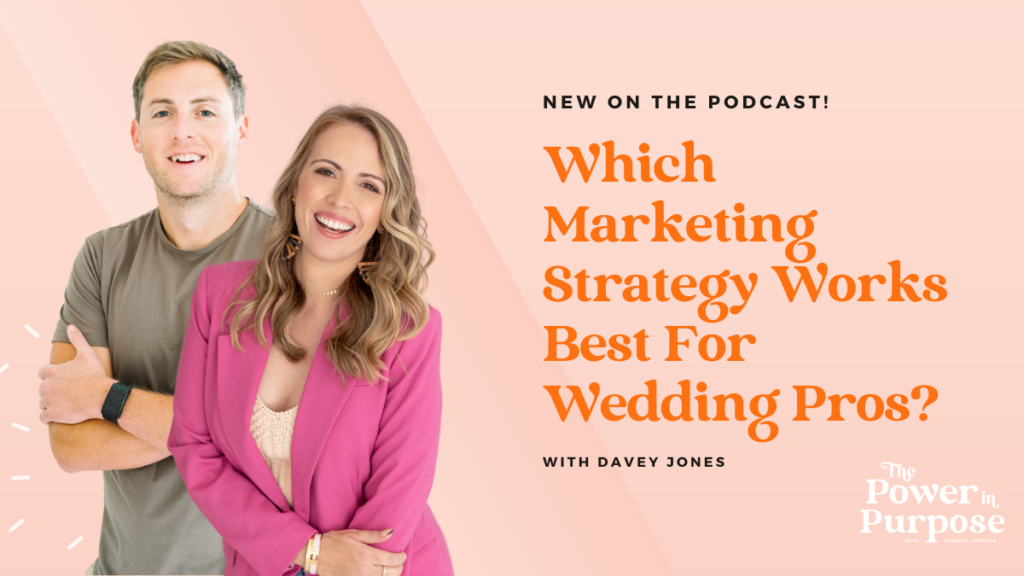
About Davey Jones
Davey Jones is a marketer, content strategist, and relationship builder. He’s co-founded two agencies: Davey & Krista, a brand and website design agency, and the Till Agency, a paid advertising agency.
He and his wife, Krista, specialize in helping people create brands that book through custom brand and website design and consulting. Over at Till Agency, Davey and his team specialize in helping online educators and coaches sustainably grow 6-7 figure businesses using scalable digital marketing strategies.
Davey believes an effective marketing strategy begins with the question: How can *that* work for someone *like me*?
He helps businesses craft an answer to that question and then develops a strategy for communicating it. After years of running two marketing agencies that have managed millions in ad spend, he’s seen firsthand the power of answering that question well.
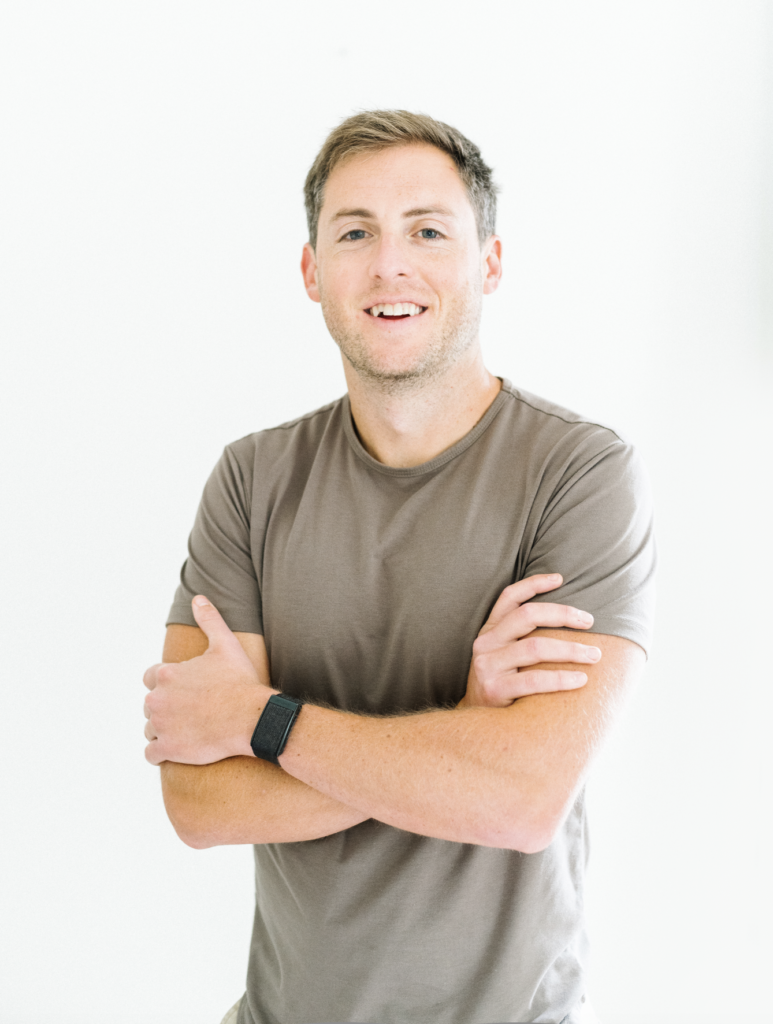
In this episode about organic vs. paid for marketing strategies with Davey Jones, you’ll learn:
- The difference between “paid” and “organic” marketing strategies
- The pros and cons of organic vs. paid marketing
- Which businesses in the wedding industry benefit from advertising
- The best paid advertising channels for wedding professionals, such as Facebook, Instagram, Google, YouTube, and magazine ads
- A starting budget for advertising no matter where you’re starting from
- The goals you should have for a digital advertising strategy
[00:00:00.000] - Candice Coppola (Host)
Which should you focus on?
[00:00:02.290] - Candice Coppola (Host)
Organic marketing or paid marketing? Well, my guest on today's episode of the Power and Purpose podcast, he wants you to use both.
[00:00:16.940] - Candice Coppola (Host)
You're here to grow a business, but not just any business. You want to grow a profitable business with purpose, a business where you wake up every single day driven to serve your customers and make a difference In your own life. I'm Candice coppola, published author, business coach, and your guide to building a profitable business with purpose. Join me here every single week as we explore how to build and grow your business with purpose. Get ready to dig in and have meaningful conversations about the strategies and techniques that will help you build your dream business. This is the power in purpose.
[00:01:00.480] - Candice Coppola (Host)
Welcome back to the power and purpose podcast. It's me, your host, Candice. And today we're having a big, fat marketing conversation with my guest, Davey Jones, all about how you should balance both organic marketing and paid marketing strategies in your wedding industry business. Davey and I, we both believe that it's important for you to experiment with both and to focus your attention on both organic traffic and paid for traffic in your business. Davey Jones is a marketer, he's a content strategist, and a relationship builder. He's cofounded two agencies, the first Davey and Krista, which is a brand and website design agency. He's also the co founder of the til agency, a paid advertising agency. You see how he's juxtapositioning these two businesses together and why he's the perfect guest for today's conversation. Now, Davey and his wife, Krista, they specialize in helping people and helping wedding pros create brands that book. They do this through custom brand and website design and consulting.
[00:02:11.400] - Candice Coppola (Host)
Over at the til agency, Davey and his team specialize in helping online educators and coaches grow sustainable six and seven figure businesses using scalable digital marketing strategies. David believes an effective marketing strategy begins with the question, how can that work for someone like me? I love this because we listen to podcast episodes, watch YouTube videos, learn from others, and we're always wondering.
[00:02:41.650] - Candice Coppola (Host)
Okay. That's cool. But how can that work for someone like me? Well, in today's episode, Davey is going to break down how organic marketing and how paid for advertising can work for a wedding pro like you, and why it's important to focus on both. So without further ado, let's jump into my interview with Davey Jones.
[00:03:05.310] - Candice Coppola (Host)
Hey, Davy, welcome to the show.
[00:03:07.290] - Davey Jones (Guest)
Yeah, thanks for having me. I'm excited to be here. I'm excited to be on the other side of the interview for a change
[00:03:14.080] - Candice Coppola (Host)
I know how that feels. I love being interviewed for other people's podcast. I find it to be so fun. I'm so glad you agreed to come on the show today to talk about organic and paid for marketing and balancing the two, how you can do that in your wedding industry business. I introduced you before we started the interview and talked about your background. But when I think about paid for advertising, I think about your agency. When I think about digital advertising and marketing, I think about all the work that you've done over the many years supporting wedding pros with website design and digital marketing. So it's great to have you as our guest today, our expert.
[00:03:47.640] - Davey Jones (Guest)
Yeah, I'm excited to be here. I'm really passionate about marketing in general. So excited to dive in and chat about whatever you feel like is going to be most helpful.
[00:03:56.620] - Candice Coppola (Host)
Yes. I think advertising and marketing, paid for marketing strategies, really is something that wedding pros have such a hard time understanding if it's the right fit for their business. We talked about this before we started, and I hope that today, and I know today, you'll be able to guide us on how we can balance both organic and paid for marketing in our business, which you believe wedding pros and creative business owners do need to do both. There should be a balance between advertising and organic marketing. I would love for you first, before we get into the nitty gritty of things, to just define these two terms for anybody listening who doesn't know what we're talking about.
[00:04:33.840] - Davey Jones (Guest)
Yeah, absolutely. So talking about organic versus paid marketing, organic, we're talking about marketing strategies that are, quote unquote, free. Nothing's ever truly free. It still takes time to create content and that thing. But we're talking about those strategies that we think of as free, posting a social media account, creating YouTube videos, maybe attending a free networking event, posting a free forum, something like Reddit, things like that. Those could all be considered organic marketing strategies. Paid marketing strategies, it is what it sounds like, marketing strategies in which you pay to get in front of a specific audience. So for paid marketing strategies, people immediately go... Their minds go to things like the Meta platform. Facebook and Instagram, both owned by Meta. Pinterest, TikTok, we've been doing a lot more advertising on TikTok of late, especially with all of the Facebook woes out there, which happy to chat about those as well. Still a great platform to advertise on, though. But it could also be paid promotional sponsors. So I'm thinking sponsoring a conference, maybe you get some video play during the conference to attendees, paid spot in a wedding magazine or paying for a listing, all of those can be part of a paid marketing strategy.
[00:05:54.100] - Candice Coppola (Host)
Yeah, thank you for that. Wedding pros, I think, are most familiar with your traditional forms of paid for marketing, which still really exists in our industry. Your average magazine ad, a bridal show, a paid for vendor directory, or a listing for a venue being recommended and referred by a local venue. Those paid for marketing strategies, I feel like wedding pros know whether it's the right fit for them. It's really when we get into the digital, the meta Facebook, Instagram, TikTok, especially, p interest marketing, because p interest has a whole advertising arm that could be beneficial for your wedding industry business. That's where I feel like wedding pros get so tripped up. What do you think are the pros and cons of using an organic marketing strategy and then a paid for marketing strategy?
[00:06:44.140] - Davey Jones (Guest)
Yeah. So I'd say for on the organic side, the pros that come to mind is one, it's free, so it doesn't really cost you anything to do organic marketing. I also like the constraints of organic marketing in the sense that it's really going to force people to get creative and think through their content. Because if the content is very good, it's not going to perform very well organically. So it's really important to think through hooks for whatever you're posting. The creative, how is it that you're going to catch somebody's attention. And I think on the paid side of things, that's one of the cons. I think people think it's a silver bullet, right? Like, oh, I'm going to pay Facebook some money and then they're going to show my stuff to everybody. People are going to buy right away. And so it leads to maybe a laziness, especially in messaging and the content that people are putting out there. So I do like the constraints to a certain extent. I think one of the frustrating things, one of the cons of just totally relying on organic marketing strategies is that there's limited visibility, especially on certain platforms.
[00:07:48.550] - Davey Jones (Guest)
With that said, I was just talking to somebody the other day, their organic reach on Facebook is incredible. I mean, it's unheard of in 2022. So it's still possible. But I would say for the vast majority of people, they probably experience the frustration of posting something to Instagram and seeing the visibility on the bottom. It's like 18 people have seen this post. I spent 18 hours creating this post. It's true.
[00:08:13.270] - Davey Jones (Guest)
I think that's one of the cons for sure. It can be difficult to get started and it takes time to build credibility and gain momentum, I think, on the organic side of things. And then on the paid side of things, the reverse is true. You can see immediate results. You know, and I don't mean to suggest that you'll always see immediate good results, but you'll understand results pretty immediately. We say it amplifies organic results. And so what we mean by that is if you're not getting very good organic results, that might be an indicator that you need to continue to refine your content before taking it over to a paid strategy. But likewise, I mean, if you are getting good organic results, typically those can be amplified. And it's good indicator that a paid ad strategy might work for you. A few other things, though, like targeting, it's easier to get in front of the people that you want to get in front of. You have a bit more control of that, you're going to get greater visibility. Most platforms, when you start giving them money, they want to get your content out in front of people.
[00:09:16.980] - Davey Jones (Guest)
And again, better content leads to better reach. But in general, you're going to get better reach just by going the paid route. I guess the one other thing that comes to mind is that it's easier to get people to click through. So it's more obvious, right? If you're thinking about ads you see on Facebook and Instagram, for instance, an organic post, yeah, there might be a thumbnail you can click on, but typically there's going to be a more explicit call to action on the ad side of things. So on Instagram, for instance, you have that banner that pops up that's like, learn more or shop now or whatever it is. So it's more obvious that, hey, this is something I need to click on and it's going to take me somewhere else. Whereas an organic Instagram post, for instance, they really want you to stay on the platform.
[00:10:01.280] - Candice Coppola (Host)
Yeah, that's a good point. I never actually noticed that. But now that you mention it, when you look at an ad, there's this flashiness to it. There's this carnival feel to it. It's click this button, something magical is going to happen. Where when I just post one of my blog posts on Facebook, it's not as magical, right?
[00:10:17.480] - Davey Jones (Guest)
Yeah, exactly. It doesn't have all the bells and whistles of an ad. I think for most social media platforms, they want people to stay on the platform. T hat's one of the drawbacks.
[00:10:29.580] - Candice Coppola (Host)
Yeah. You raise a couple of good points that I'd love to just touch on again. It sounds to me that you're of the opinion that a wedding pro, before they go the paid for advertising route, or one thing they should consider before they decide to do paid for digital advertising and marketing is to make sure that their current content, their organic content is converting, that their website is converting, their sales pages are converting, that the Instagram account that they have for their business is converting before they decide to throw money at bringing in traffic.
[00:11:00.990] - Davey Jones (Guest)
Yes, 100 %. And I think that people mistake... One of the biggest mistakes I see in marketing is people mistaking the platform for the content. And so what I mean by that is there's this mindset of, Oh, I need to go and learn Instagram, or I need to go and learn TikTok. All those things are important. There's certainly a little bit of a science behind, like, what's the best time to post and what content you should post to those platforms. But what people really should be learning is how to create compelling content, how to think through, what is that hook that's going to get somebody's attention? What is that creative that's going to get somebody's attention? And ultimately thinking every step of the way, how can I get somebody to the next step? How can my creative stop somebody from scrolling? How can my headline? Typically, people's eyes go from creative to the headline to the text, right? And so thinking through every step, how am I going to get somebody's eyes to the next step? Once they get to the text, how can I get them to click this link and go to the landing page wherever I'm sending them?
[00:12:03.140] - Davey Jones (Guest)
That's what people really should be focusing on. And if people focus more on learning those skills, then they're going to see a payoff on any platform that either exists now or is going to exist in the future. So really, I think that's what people should be focused on. To your point about organic results, there's definitely some cases where somebody's not getting great organic results and they start with paid ads and then all of a sudden they're getting better results. And that could be because there's better targeting on the paid side of things. I'd say in most cases, though, if it's crickets when it comes to engagement on the organic side, I would try to fix that organically before I try to go to a platform where I can scale that. And that's going to look different on the organic side. That doesn't mean you have to like, oh, I have to write a viral post first before I ever tried paid ads. But it really does mean that you should be getting some engagement on the organic side of things. People should be clicking through your organic post. People should be commenting, sending you DMs, whatever before you decide, Okay, hey, this is working.
[00:13:13.390] - Davey Jones (Guest)
And I think I'm going to apply this strategy to hate ads.
[00:13:17.060] - Candice Coppola (Host)
Such a good point. People ask me, Candice, how can I get more engagement on my Instagram? How can I get people to open up my emails? And I tell them, Well, just write emails that people want to read and they'll open them. Sounds easy, doesn't it? But it's true. If you write emails that people want to read, they'll open them. I read Davy's emails every single week. They come to my inbox, I always open them, I always read them. He writes emails that people want to read. And so part of this equation, it sounds like, is to get really good at understanding who your ideal client is and create a marketing content strategy that engages them organically and naturally.
[00:13:54.960] - Davey Jones (Guest)
100 %. And I can't emphasize enough how important it is to really understand your ideal client. I think people roll their eyes at the client avatar, customer avatar activity, but it's such an important one to go through because oftentimes, and I do this as well, after years and years and years of being in marketing, if I'm not careful, I fall back into talking to everybody. My message is becoming a little bit more generic and I have to really reorient myself by going back to my client avatar and saying, Okay, I am writing to this person specifically and carry that over into the content that I'm creating. Really focus on creating these core pieces of content and then figuring out how to share that to the different platforms that you're on. But the platforms are secondary. And again, one thing that really helps me is breaking it down step by step. I think one of the most important lessons in marketing is to focus on getting people to the next step. You don't have to sell your entire product or service in an ad. You don't have to sell your entire product or service in an email.
[00:14:55.120] - Davey Jones (Guest)
When I'm sending an email, I'm thinking, okay, people are going to see the subject line and they're going to see the preview text. All right? So how can I use the subject line and preview text to get somebody to open the email? Once they've opened the email, how can I write content in that email that keeps their attention and ultimately gets them to the call to action, which gets them to wherever it is that I'm trying to send them? And so I think by breaking it down into steps like that, it becomes a lot more manageable for people to really understand how content can work for them. Yeah, it's.
[00:15:22.860] - Candice Coppola (Host)
Like a marketing master class. I love this interview. Good. Yeah, this is very good. What kinds of businesses in the wedding industry do you think could benefit from a paid for strategy? We know that every business needs to have an organic marketing strategy, and you've broken down some great things that our listeners can go and do to beef up that strategy, make it a better strategy to tee up perhaps a paid for strategy. But what businesses can benefit from paid for advertising and marketing in the digital space?
[00:15:52.480] - Davey Jones (Guest)
Yeah, that's a great question. I think one thing I should say at the outset is maybe a paid strategy isn't for everyone. We ran a wedding photography business before jumping into website design, and it's been years and years since we ran that business. But we shot 20 weddings a year. We didn't have any associated products that were really scalable. We didn't have associates that shot under us. It's funny thinking back to those days, there's all sorts of things that I would do to make that business more scalable, I think, than it was. Maybe starting with associates, but that's for another podcast interview. What I'm doing, what I was getting at was just to say that just because you can run paid ads doesn't mean that you should run paid ads. And so it might not be for everyone. For us, we could fill 20 weddings a year through basically focusing on search engine optimization and word of mouth and just networking well with some of the top planners in our area. And that did the job for us. And so there wasn't really this need to go out and then get extra visibility via Facebook ads or something like that.
[00:17:00.700] - Davey Jones (Guest)
That's not to say it couldn't work for somebody who's doing that same thing. And I think it can work whether you are a large associate team trying to do high volume or whether you are just shooting 20 luxury weddings or planning 20 luxury weddings a year. Obviously, how you execute it on a luxury level is going to be a little bit different how you execute on a high volume level. But in general, I would say that it's a best fit. Some paid ad strategy is probably the best fit for businesses that have large associate teams, high volume businesses, businesses that also have some scalable aspect through their business. So I'm thinking just immediately courses, memberships, conferences, those sorts of things. But like I said, it can work for smaller businesses, too, and we can get into that a little bit more as well.
[00:17:49.160] - Candice Coppola (Host)
Yeah, I would love to know your thoughts around smaller businesses. So the businesses that maybe only take 20 to 30 events a year, how they might be able to tap into a paid for marketing strategy, maybe even outside of the digital realm. What do you think would be the right.
[00:18:08.490] - Davey Jones (Guest)
Fit for them? Yeah, that's a great question. I should also preface what I mean by smaller businesses. I'm not suggesting to you that I mean smaller in the sense that maybe they're low volume, but not necessarily that they're like, you know, not killing it. Low quality. I think when we finish shooting, our average wedding was somewhere in the $10,000 range. So just want to preface by saying that. So basically, if you're approaching just an ad strategy and talking maybe some of the differences between somebody who's doing high volume and just needs to get people in the door and generate leads versus somebody that's more on the luxury level side. On the high volume side, you're probably going to have some lead gen going where basically you're giving something away for free. Maybe it's like free consultations for planning, that thing, just because you're trying to get as many meetings as possible because you're going to close a percentage of those meetings. In general, that's going to attract a certain crowd. Whereas on the luxury level side, those clients probably aren't looking for that thing. They've probably followed a planner for years. There's just a different mentality.
[00:19:20.120] - Davey Jones (Guest)
So on the luxury side of things, you could still use it for some brand awareness. You could still use it to show off maybe some of the best weddings that have been planned in the past year, that thing. But I think that at least in our experience, our money had been better spent on things like gifts. And I'm talking about as a wedding photographer here, but I bet the reverse is true, gifts for wedding planners in the area and really building our relationships that way. Maybe paying to go to networking events where I know some of the better planners are going to be there. And you teach about the wedding planning thing all the time. I don't know if this is true. Maybe you can speak to this. I know when we were photographers, a lot of couples would either reach out to a venue, a photographer, or a planner first. And so as a photographer, we were constantly sending recommendations to planners. So my guess is that if you're a planner getting started, you want to break into a luxury level market, it's probably beneficial to start building relationships with the luxury level photographers in the area.
[00:20:25.480] - Davey Jones (Guest)
Is that right?
[00:20:26.540] - Candice Coppola (Host)
Yes. Photographers and venues is what I teach people to really focus their attention on when they're just getting started or when they're looking to level up to the next level of client. So they're looking to get a higher end client or shift their niche to focus on the people who are already in front of that customer.
[00:20:42.380] - Davey Jones (Guest)
Yeah, awesome. I would say paying for gifts, that's where my paid marketing strategy would come in. And that's something that we really focused on back when we were running a wedding photography business and using that as a way to start the conversation with different venues or different planners in the area and start building a relationship with them. Another thing is we used to pay for... I forget, I think it was called the little black book and style me pretty. And you'll have to fill your audience in on whether it's worth it or not. Back in the day, it felt like it was worth it.
[00:21:18.720] - Candice Coppola (Host)
It did. It worked back in the day. Not so much these days. I feel like your link gets lost and they also do no follow links to your website. So you're not even getting that domain authority boost or that back link boost anymore that you used to get. And just like Facebook and Instagram wants to keep you on its website, sites like style me pretty, they want their users to stay there and to click on ads and to buy products and use affiliate links. And they don't want you they don't want them to necessarily go to your website unless they're making money off of it. A lot of money off of every click. So yeah, it's changed quite a bit in that arena.
[00:21:54.640] - Davey Jones (Guest)
Yeah. So that's a bummer here. I mean, during the last maybe year or two, we had stopped paying for that as well. I was never a huge fan of paying for listings in the wedding wire or not or things like that. We never felt like we got qualified leads from those spots. But all that to say, if you are a luxury level provider and you want to maybe break into that market, PR would be a good paid strategy to invest in. And I think a very underrated one. I think we often think PR is for big brands like Coca Cola and Pepsi or whatever. But it can be a really effective means to get in front of the right people, especially on local levels. And again, when we talk about PR, it's not necessarily being featured in Good Morning America or something like that. You can drive really qualified luxury level leads in local spots. I would recommend if you're going that route and you're a luxury level service provider, working with a PR firm that's a little more niche and a little bit more of a craft PR agency, if that makes sense, versus somebody who's doing it at volume and is just trying to get to as many spots anywhere as possible.
[00:23:04.060] - Davey Jones (Guest)
But those are all aspects of a paid marketing strategy that you could employ as a smaller business that doesn't do high volume.
[00:23:14.940] - Candice Coppola (Host)
Hey there, friend. Real quick, I want to share with you how you can sign up for a free trial with Honey Book. Honey Book is everything you need to get business done. And it's trusted by over 100,000 independent businesses just like yours to manage projects, book clients, send invoices, and most importantly, get paid. If you've been looking for an all in one solution to manage your customers. I want to invite you to sign up for a free trial with Honeybook. Go to candice coppola. Com honeybook to learn more. When you sign up for a free trial using the code purpose, you'll save 50 % off of your first year's subscription. Honeybook is what I used in my business as a wedding planner, and it helped me land every single sale. It's what helped me build a six figure wedding planning business. It's also what helps me today in my business. Go to candice coppola. Com honeybook to learn more and with the code purpose, save 50 % on your first year's subscription.
[00:24:29.600] - Candice Coppola (Host)
So if digital marketing, digital advertising isn't going to be the right fit for your business right now, these are all some really great ideas. When I first started my business, I saw the value in aligning myself with brands that were established. So I paid for advertising in this magazine. It was called Grace Vermont, and it was like the best of the best luxury wedding professionals. And here's a funny fact, I had no idea what I was doing. I'd never planned a wedding in my life, and they were willing to take my $5,000 and slap me in this exclusive best of the best.
[00:25:02.200] - Davey Jones (Guest)
That's awesome. Yeah, that's awesome.
[00:25:04.680] - Candice Coppola (Host)
But it also just goes to show you how much BS is out there with some of this stuff, right? But it instantly gave me a boost and some social proof, which is what I needed or what I felt I needed when I first started my business. I feel like I needed to align my business with a website like the Knot or Grace or Mon so that a customer could see, Oh, wow. She's been vetted by this entity I recognize. She must know what she's doing, even though I had no idea.
[00:25:32.060] - Davey Jones (Guest)
What I.
[00:25:32.580] - Candice Coppola (Host)
Was doing.
[00:25:33.380] - Davey Jones (Guest)
On the paid side of things, you could create probably an editorial style page strategy where you're just you shoot or not shoot, I'm sorry, you plan a wedding for and it turns out beautiful and it's for the client you want to serve. I know a lot of people, especially in the paid ad side of things, are down on like posting posts and things like that. But taking $50 and putting it towards running traffic to a wedding that you are very proud of. Think about how many more thousands of people are going to see that. And if you're booking weddings for thousands, tens of thousands of dollars, what's $50 to boost the post and get it in front of a targeted group of people in the thousands?
[00:26:19.920] - Candice Coppola (Host)
And you bring up a good point about building brand awareness. You had mentioned this earlier. I think a lot of people when they think about paid for advertising, they're just thinking about clicks, they're thinking about likes, they're thinking about followers, they're thinking about people converting into a customer from that ad directly, almost instantly like ad to cart and buy. But sometimes advertising and digital advertising isn't necessarily about getting that sale that chitching in your Honey Book account immediately upon clicking. Sometimes it's just about building that brand awareness and making sure people know about your brand and what it is that you do and building that brand familiarity. Down the line, you might convert somebody into a customer, they might think, Hey, you should check out this planner I saw on Instagram, and they saw you because of an ad.
[00:27:04.680] - Davey Jones (Guest)
100 %. I would say I'd go even further than that and say that's most of the time. A lot of times that when especially when we're talking to a potential new client on the agency side of things. One thing that we're going to be asking about is what email systems do you have set up to really nurture these leads? Because really people have good email funnels or at least some funnel to nurture leads, and that's going to look different across businesses and things like that, those people are more likely to succeed with paid advertising. I think red flags go up when it's like, Hey, never run ads before, and I want to run an ad straight to my contact page, somebody who's ready to inquire and book right away, or on the e-commerce side of things, running straight to the shop. They don't want to do any lead generation or any nurturing on that side of things. And we very much encourage people to think about the customer journey and think about where you can catch people's attention. And then think about the nurturing that has to go on between getting their attention and then getting them maybe on the phone to book or in your shop to purchase.
[00:28:08.580] - Candice Coppola (Host)
I.
[00:28:10.300] - Davey Jones (Guest)
Would agree that we're trying to take a full funnel approach. I mean, we certainly go back to e-commerce here just because the example is more readily available. But we're going to be doing a lead gen campaign that's going to be higher up the funnel that's going to be more just making people aware of that business or brand. But then we'll do some retargeting towards the actual product or whatnot. But I think a lot of the magic happens top of funnel and down and nurturing. And I think if you go into it thinking like, I'm going to spend a few dollars a day and people are just going to be going crazy in my shop, just not how it works.
[00:28:48.340] - Candice Coppola (Host)
It's so true. Many entrepreneurs forget about the nurturing aspect of marketing and advertising. And when you run ads to an audience, it depends on the different filters you put in what audience you're running ads to. Obviously, with digital marketing, you can get specific about who might see your ad or who you're targeting. But those people are cold to you. They don't know you. They've likely never heard of you. You have to warm them up. There's a process that happens that you have to be the leader of for them to get to trust you enough to exchange.
[00:29:21.890] - Candice Coppola (Host)
Money, whether.
[00:29:23.200] - Candice Coppola (Host)
That money is in sending you an email to inquire or physically buying something off of your website. The stakes get even higher when you're asking people for thousands and thousands of dollars for a high level service.
[00:29:35.740] - Davey Jones (Guest)
100 %. Yeah, absolutely. The more expensive your product is, the more expensive your service is, the more you have to do to bridge what we call the trust gap and really getting somebody from having become aware of you to trust you enough to spend money with you. I 100 % agree with that. I mean, we manage tens of thousands of dollars, especially this time of year, hundreds of thousands of dollars sometimes a month in ad spend. And I'll tell you that typically the people who are getting the best results are doing some lead generation on a consistent basis.
[00:30:12.440] - Candice Coppola (Host)
Yeah, they understand their ideal client. They have a system in place to nurture those customers and bring them through a sales funnel that nurtures them. And they maintain some consistent contact in that lead generation. I love that. When we look at paid for advertising for wedding pros and we look at the digital space, traditionally, we're looking at Facebook, Instagram, Google, YouTube, Pinterest. What do you think right now, at least at the time of this recording, which is moments from Black Friday, so we're at the end of 2022, what do you think is working well for wedding industry pros right now? If they were to put money into paid for advertising, which platform do you think would probably generate a good result?
[00:30:53.600] - Davey Jones (Guest)
Yeah, it often depends on the type of business for sure. Again, we're going to approach high volume businesses, maybe with multiple locations, different than we would the luxury level service provider who's only going to take on a handful of events a year. Or the luxury level provider, probably thinking Google Facebook, Instagram, I think is still a good place. But Google certainly comes to mind just because, again, you can capture that search intent. There's still a lot of great targeting options on Google. On the other side of things, the wedding industry professionals or businesses out there who have multiple locations across different cities and states, and you book through this company to get someone anywhere, of course, we're going to think Facebook, Instagram, and go that route. Tiktok, Pinterest, some of these other platforms, they're all good platforms. If you have money to test, they're good platforms to test on. I would say they're just not quite as advanced as what you're going to find with Meta's platforms and with Google's platforms. So we're always spending a little bit of money on Pinterest. Pinterest has just been a great source of organic traffic for us. Granted, we are also selling products as well.
[00:32:08.050] - Davey Jones (Guest)
But I got to imagine, still in the wedding industry, Pinterest is a great driver of traffic. So worth spending some time there if you have some extra budget. I don't see a situation where anybody... I'm saying, Oh, if you're not on Pinterest, if you're not advertising on Pinterest, you need to be advertising on Pinterest right now. So I don't know if that answers your question, if that helps.
[00:32:28.020] - Candice Coppola (Host)
It does. I have a little follow up question. If you don't have an organic, consistent strategy on a platform, does that mean that you should reconsider advertising on it? So I'm thinking about something like TikTok where a wedding pro right now listening might be scared of TikTok. They have to haven't really gone over there yet and started to organically market their business. Would that affect if they should advertise over on TikTok?
[00:32:53.500] - Davey Jones (Guest)
Yeah. So I think it comes down a little bit to budget. I would say it's not a hard and fast rule like, oh, if you've never had an organic presence or you don't have a great organic strategy or you're not seeing results on the organic side of things, you should never advertise. One of the great things about paid advertising is that it's going to give you results a little bit more quickly. You share something in Facebook, it's going to typically, your reach is not going to be great. And so as far as the test goes, it's really hard to see what's working, what's not, maybe about that piece of content you're sharing. Whereas on the paid side of things, let's say I was creating a course, and again, I don't know how applicable this is going to be to a lot of your audience, but I could write... If I'm thinking about what angle my course should take, or what form it should take, I could write a blog post based on my different ideas. And then I could basically test titles across the Facebook ads. And so I could see, when I test these against each other, more people are interested in this angle and this topic.
[00:34:00.130] - Davey Jones (Guest)
And so maybe that's what I then go and create my course out of. Even though I don't have a course to sell yet, ads were helpful there. Same thing with maybe sharing galleries. You're trying to decide what galleries you want to feature on your website. We're huge proponents of only showing off your very best work on your website. Maybe you're trying to figure out what that is, what really resonates with people. I mean, this is something that we're always surprised about. This is one of the great things about running ads is the different tests you can do. So you probably have an idea of what people are attracted to. But you could run ads to a number of different galleries, try to keep the hooks similar, try to keep everything else similar, just changing maybe the gallery itself and see what people click on. And then maybe the things that people are clicking on more, those are the galleries you highlight. And of course, I'm not saying that you should spend hundreds of dollars on this test, but you could spend probably $50 across each one of those ad sets just to see what's working and go from there.
[00:35:02.320] - Davey Jones (Guest)
So there's definitely learnings that you can gain from running ads, even if you don't feel like necessarily you're ready for that.
[00:35:11.700] - Candice Coppola (Host)
I love the data mining here with running ads because it can be really hard to get people to fill out your survey or your feedback form or get people to vote in your poll. It can be really challenging to get people to do that. Just to your point, running ads that help you to understand what converts, what the eye is buying, what people are gravitating toward can help you to figure out some things with your organic marketing on your website. I think that's brilliant idea.
[00:35:40.340] - Davey Jones (Guest)
Yeah. And it's one of those things where you have to have a stomach for testing. And I'll say right off at the outset, we've worked with clients who are like, we want to test everything. But really at the end of the day, they don't really want to test everything. It can be hard to run ads to something as a test, knowing that it might not work, and then it doesn't work, and then shut down the test too quickly. So all of those things, I think, are just things that you have to keep in mind. You have to keep in mind the long game and really understand the purpose behind why you're running these ads. I think in order to be successful. And that's true, of course, of pretty much anything. Agreed.
[00:36:19.520] - Candice Coppola (Host)
Let's talk about budget. I feel like running ads can be like putting money in a slot machine. Where does it go? Nobody knows. So for the person listening who is interested in testing and trying ads to see how they can help their organic marketing and help generate leads, what do you think is a respectful starting budget for a small business in the wedding industry?
[00:36:44.260] - Davey Jones (Guest)
One of the great things about a platform like Meta, for instance, or Facebook and Instagram is that you can spend just a few dollars a day. So if that's your budget, just go on and spend. Set your budget to whatever you're comfortable with and see how it works. Typically on the agency side of things, what we're doing, people, is that we're not going to work with people if they're not willing to spend at least $50 a day on a given campaign. In part because you have to think about how long it's going to take to figure out whether that test is working. Again, if you're trying to book... If you're selling a collection for $5,000 and you're spending $5 a day on ads and you're willing to spend, I don't know, up to $500 to acquire a client, then t hat's what you've set aside for marketing in order to acquire a single client. Think about how many days it's going to take for you to figure out whether that $5 a day test is working. Those are the things that you have to balance. It's not wrong to spend that little. It's just you have to understand that you're not going to get the data in as short amount of time if you're spending a little bit more.
[00:37:52.900] - Davey Jones (Guest)
When you're spending more money, you're going to have to make changes more quickly because you might start at $50 a day and things aren't working within the first week, and you're like, Well, I can't just keep on going and spending that money. But you at least have that data a little bit more quickly. I know that's a non answer to a certain extent, but I would encourage people, no one wakes up having just learned Facebook ads or.
[00:38:19.850] - Candice Coppola (Host)
Tiktok ads or whatever. It is excruciatingly hard to understand Facebook ad manager. I used to write code and I feel like that is a lot easier than trying to figure out ads manager.
[00:38:32.800] - Davey Jones (Guest)
Well, it doesn't help that ads manager changes so frequently. They're apparently testing. One of my partners, one of my business partners at Tilt, told me that they're testing something like 30 different versions of ads manager at a time. So even if I was the screen share, my ads manager might not look like yours. So it definitely can be a little overwhelming. But if you spent a little bit of time in there each week, you're going to learn it. You're going to pick it up. Facebook, for instance, has a Facebook blueprint course that you can go through. And it's just like anything else, takes a little bit of time to learn. But I would encourage people, if they're interested in this, just go and learn. Make sure you set your budget, maybe lower than you want to start just so you don't make any expensive mistakes. But go in there. Don't be scared to make some mistakes. And I think after a while, sticking to it, you'll figure it out.
[00:39:22.450] - Candice Coppola (Host)
That's a good point. I think just getting your feet wet, trying it out, seeing how it works. You won't know until you try setting a a a a a a a respectful budget per day, getting in ads manager and trying to figure out how it works will teach you a lot about digital advertising and how you can leverage it for your business based on the various goals that you shared with us today, like brand awareness or bringing in leads, whatever your goals might be. Davy, this is my final question for today. How does somebody listening know if they're ready to hire an ads manager, like a team, an agency, like the agency you run, the til agency?
[00:39:57.330] - Davey Jones (Guest)
I would say that one, you want to have a clear goal in mind. I would say that typically we're working, most of the wedding pros that we work with, we're working with on something like search engine optimization. Import, because again, on a low volume scale, if you are a low volume business, and again, there's nothing wrong with that. But if you're a low volume business, then an agency like ours probably doesn't make a ton of sense on the digital advertising side of things. However, if you are doing high volume, then an agency might make sense. Having an understanding of ads manager, for instance, one of our recent clients and I'd help them get some of the technical stuff set up for their first course launch. And I encourage them to try to run ads on their own for their first course launch. They got in there, they had a pretty good launch. I think it exceeded expectations, if I remember correctly. This is a few years ago now. And they understood then what went into one launching and two just managing ads. When they came over to the agency, we're able to speak to them in a way that makes sense.
[00:41:08.170] - Davey Jones (Guest)
They're familiar with the different pieces. I think that thing is best case scenario. With that said, it does make t mean that you have to try it on your own first. But having a clear goal in mind for sure. And then it's just a matter of making the numbers make sense.
[00:41:26.060] - Candice Coppola (Host)
Yeah. Does your agency take a look at somebody's business as a whole, their organic marketing, to see how that would play into the paid for strategy?
[00:41:34.880] - Davey Jones (Guest)
100 %. Especially there hasn't been a launch around that has utilized the paid advertising strategy in the past. We're going to be very curious about what the organic results look like, what the organic strategy looks like. Because again, especially if new business comes to us and they haven't seen really any organic movement, we're going to be pretty hesitant to bring them on and run ads for them. So with that said, when clients do come on, we do take a very holistic approach to paid advertising. We really want to be partners with the businesses that we work with. We're really trying to take a look at the funnel from top to bottom and see the ways in which paid advertising can support the funnel.
[00:42:17.630] - Candice Coppola (Host)
Yeah. Oh, I love that. I feel like I need a brochure of your services for myself.
[00:42:24.640] - Davey Jones (Guest)
Yeah, we'd be happy to send them out.
[00:42:28.120] - Candice Coppola (Host)
We're making deals here on this podcast. Davey, thank you so much for joining us today. I seriously feel like this was a master class in all things marketing, and you and I could probably talk about so many other topics around marketing. Maybe we'll have you back on the podcast. Tell our listeners where they can, if they don't know where to connect with you, how they can connect with you outside of our show.
[00:42:47.760] - Davey Jones (Guest)
Yeah. I mean, thank you so much for having me on the podcast. Hopefully, we'll be able to continue the conversation over on my podcast in the next month or so. That would be a lot of fun. And then I could be asking you the questions. So if people want to follow along, they can follow along over at Till Agency, which is til.agency. That's the website. And then it's actually also the Instagram handle as well, til.agency. We do, at least right now, I'm not sure how much longer this is going to last, honestly, because this is our busy season. Black Friday is like...
[00:43:18.990] - Candice Coppola (Host)
I'm surprised you're here, to be honest. I'm very impressed.
[00:43:22.640] - Davey Jones (Guest)
We have a great team. But we do free audits. So if somebody's interested in, if they have a paid strategy going and we'll jump into ads manager for you and just give you free feedback on what we're seeing, what we would do differently, what we recommend you doing. And that's regardless of whether somebody moves forward with us or not. So you can check that out over at til.agency. On the brand and website design side of things, you can find me over at dvandcrista. Com. And same thing on Instagram as well @ dvandchrista.
[00:43:54.780] - Candice Coppola (Host)
Awesome. Well, hopefully we'll see you again here on the show. Thanks so much for joining us.
[00:43:59.240] - Davey Jones (Guest)
Yeah, thank you. I want.
[00:44:00.480] - Candice Coppola (Host)
To thank Davey for being an amazing guest and having just a real down to Earth marketing conversation with me today. I hope you enjoyed today's episode and our conversation. I'd love to know, what was your biggest take away on our conversation about organic and paid for marketing. Head over to my Instagram @ Candice.
[00:44:18.620] - Candice Coppola (Host)
Coppola and.
[00:44:19.800] - Candice Coppola (Host)
Share with me your biggest take away from today's episode. Now, I have linked to all the things that were mentioned in today's episode over in the show notes, so be sure to head to the power and purpose podcast. Com. Grab your links for the things that we mentioned and also go and link up with Davey for all of your organic and paid for marketing needs. Davey, thanks so much for being such a great guest. Friends, I will see you in the next episode. And as always, I'm here to remind you, there's so much power in your purpose. Until next time.
[00:44:55.280] - Davey Jones (Guest)
Thanks so.
[00:44:55.620] - Candice Coppola (Host)
Much for tuning in to this week's episode of the Power and Purpose podcast.
[00:45:00.180] - Candice Coppola (Host)
If you enjoyed the show.
[00:45:01.380] - Candice Coppola (Host)
Be sure to subscribe.
[00:45:02.780] - Candice Coppola (Host)
So you never miss an episode and consider.
[00:45:05.920] - Candice Coppola (Host)
Leaving a review.
[00:45:07.580] - Candice Coppola (Host)
Head.
[00:45:07.880] - Candice Coppola (Host)
Over to powerandpurpose podcast.
[00:45:10.680] - Candice Coppola (Host)
Com to access.
[00:45:12.140] - Candice Coppola (Host)
All of the resources.
[00:45:13.400] - Candice Coppola (Host)
And links mentioned in.
[00:45:15.380] - Candice Coppola (Host)
Today's episode. That's powerandpurpose podcast.
[00:45:19.670] - Candice Coppola (Host)
Com. I'll see you next time.
Sign up to receive email updates
Enter your name and email address below and I'll send you periodic updates about the podcast.
Thanks for tuning into today’s episode of The Power in Purpose Podcast. I want to know– what was your biggest takeaway? Head to my Instagram to join the conversation!
CONNECT WITH DAVEY JONES
- Check out Davey’s Website
- Follow Davey & Krista on Instagram
- Check Out The Till Agency’s Website
- Follow The Till Agency on Instagram
Explore More Wedding Industry Resources
- Aleya Harris On How To Differentiate Yourself In The Wedding Industry
- Copying In The Wedding Industry: How To Handle Thieves Who Steal Or Copy Your Work
- How To Level-Up Your Storytelling In Your Marketing (And Attract Clients)
- Round-Up: Top 6 Best Marketing Tips For Wedding Pros For 2023
- Honeybook Plans: Which Honeybook Plan Should You Choose For Your Business?
- Amy Porterfield Wants You To Give Your Two Weeks Notice: How To Quit Your Job & Go All In As A Wedding Pro
Some of the links used in this blog post are affiliate links. When you purchase something, our company receives a small compensation at no cost to you. This compensation helps to maintain the cost of creating helpful content, like our podcast, so you can build a profitable business with purpose.
filed under:
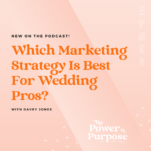
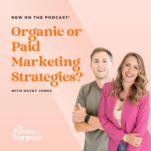
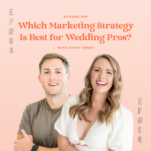
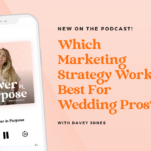
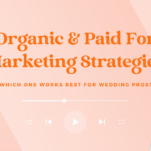
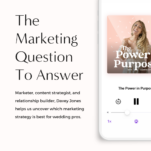
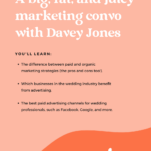
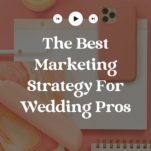
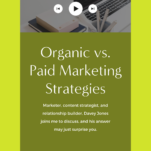
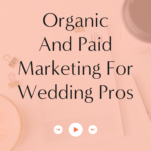
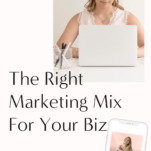
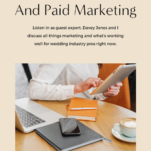
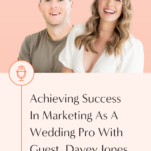
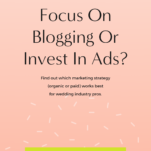
+ show Comments
- Hide Comments
add a comment